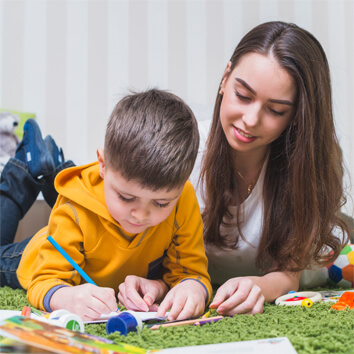We need to think of vocabulary as a building block. Its intrinsic value is only complete when part of a larger structure. Research shows that vocabulary is far more important than the individual words, and their meaning. Vocabulary knowledge, breadth and depth are directly correlated with a child’s overall development.
The Power of Vocabulary
What’s remarkable is the wide reach that a broader vocabulary base brings. We know that children from different backgrounds have vast differences in the number of words in their vocabulary: by the age of just 3 years old there is a 30 million word gap between the poorest and the richest children.
Vocabulary is the springboard for succeeding at school, learning to read, gaining skill in all subjects and enables complex thinking. Building vocabulary in young children is of paramount importance.
However, this is where it gets even more interesting. There comes a point for very young children, as they move in to the preschool years, when it’s not just about the quantity of vocabulary they are exposed to. Studies show that the quality of vocabulary becomes more important. This means exposing the child to words and ideas which are slightly beyond their current level of understanding to boost their vocabulary foundations.
This has an incredibly powerful effect on their overall development. Children who experience this type of exposure and language development, and in so doing acquire a greater and deeper vocabulary (both in their own language and a second one), are able to do a number of different things to a higher standard than their peers.
These children are able to confidently tackle more complex thoughts and ideas. They are able to express themselves more easily. They learn things more quickly and with greater ease. The process of learning to read is propelled forwards. They even do better in seemingly unrelated subjects such as maths.
How to Build Vocabulary in the Early Years
Understanding the importance of building vocabulary is the first step. Then we need to consciously act on that information in order to increase the breadth and depth of children’s vocabulary both using their early years’ settings and the home environment.
There are numerous ways we can do this:
- Conversation: As we engage in conversation with young children we need to be mindful of how we talk, prioritising conversational interaction. Effectively providing a running commentary on a child’s day, thinking aloud, and entering discussion with them should be automatic. As the child grows you should naturally be using new words within their familiar environments.
- Maximise the power of stories: Stories give us a fantastic avenue for building a child’s vocabulary in the early years, especially in second languages. Stories which are engaging, especially when they appeal to visual learning using animation, have the ability to introduce new vocabulary in a memorable context. Stories are also a great way of deepening the knowledge of a word, for example by using association, how a word works with other words, and grammar.
- Reading and books: Once a child is able to read they have a rocket-fuelled ability to acquire new vocabulary. However, this doesn’t need to wait until they can read for themselves. By sharing print and books together, children are able to hear new vocabulary in context, building the very foundations of reading.
- Role-play: By engaging children in role-play scenarios you can boost vocabulary. Different meanings can be conveyed in different ways, for example a sponge may not just be ‘wet’, but ‘saturated’, ‘soaking’ or ‘sodden’. Additionally, role-play is an opportunity to mirror language in order to extend it. For example, a child may say “Here’s your drink”, to which the adult could reply “Thank you, such lovely tea. It’s warm and refreshing.” Role-play used in this way, to extend language, is also hugely powerful in complete immersion foreign language learning.
- Follow your child’s lead: Children learn best when they can relate to the context. For example, if your little one is enthusiastic about cars then they can be exposed to deepening vocabulary such a ‘mechanic’, ‘speed’ or ‘accelerating’. A child who loves to bake can hear terms such as ‘whisk’, ‘beat’ or ‘sprinkle’.
- Don’t give up: There is a time-lag, possibly of around 12 months, between a child’s exposure to a word and their own use of it. They need to hear the word several times, in different contexts, to cement it in to their own vocabulary. Always remember that understanding comes first, use comes second. This doesn’t mean they aren’t benefiting and building their vocabulary.
The Tales of Arthur the Elf is a programme designed to boost vocabulary acquisition in the early years and primary in a second language. To find out more about our programme, please click here.

